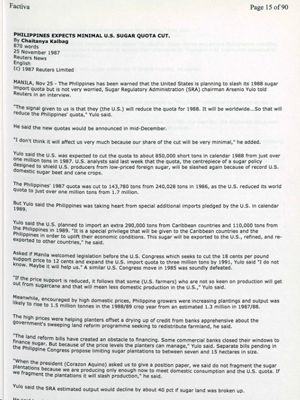PHILIPPINES EXPECTS MINIMAL U.S. SUGAR QUOTA CUT
[Reuters]
Published date: 25th Nov 1987
25 November 1987
Reuters News
English
(c) 1987 Reuters Limited
MANILA, Nov 25 – The Philippines has been warned that the United States is planning to slash Its 1988 sugar Import quota but is not very worried, Sugar Regulatory Administration (SRA) chairman Arsenio Yulo told Reuters in an interview.
The signal given to us is that they (the U.S.) will reduce the quota for 1988. It will be worldwide … So that will reduce the Philippines’ quota,” Yulo said.
He said the new quotas would be announced in mid-December.
“I don’t think it will affect us very much because our share of the cut will be very minimal,” he added.
Yulo said the U.S. was expected to cut the quota to about 850,000 short tons in calendar 1988 from just over one million tons in 1987. U.S. analysts said last week that the quota, the centrepiece of a sugar policy designed to shield U.S. producers from low-priced foreign sugar, will be slashed again because of record U.S. domestic sugar beet and cane crops.
The Philippines’ 1987 quota was cut to 143,780 tons from 240,028 tons in 1986, as the U.S. reduced its world quota to just over one million tons from 1.7 million.
But Yulo said the Philippines was taking heart from special additional imports pledged by the U.S. in calendar 1989.
Yulo said the U.S. planned to Import an extra 290,000 tons from Caribbean countries and 110,000 tons from the Philippines in 1989. “It is a special privilege that will be given to the Caribbean countries and the Philippines in order to uplift their economic conditions. This sugar will be exported to the U.S ., refined, and re- exported to other countries,” he said.
Asked if Manila welcomed legislation before the U.S. Congress which seeks to cut the 18 cents per pound support price to 12 cents and expand the U.S. import quota to three million tons by 1991, Yulo said “I do not know. Maybe it will help us.” A similar U.S. Congress move in 1985 was soundly defeated.
“If the price support is reduced, it follows that some (U.S. farmers) who are not so keen on production will get out from sugarcane and that will mean less domestic production in the U.S ., ” Yulo said.
Meanwhile, encouraged by high domestic prices, Philippine growers were increasing plantings and output was likely to rise to 1.5 million tonnes in the 1988/89 crop year from an estimated 1.3 million in 1987/88.
The high prices were helping planters offset a drying up of credit from banks apprehensive about the government’s sweeping land reform programme seeking to redistribute farmland, he said.
“The land reform bills have created an obstacle to financing. Some commercial banks closed their windows to finance sugar. But because of the price levels the planters can manage,” Yulo said. Separate bills pending in the Philippine Congress propose limiting sugar plantations to between seven and 15 hectares in size.
“When the president (Corazon Aquino) asked us to give a position paper, we said do not fragment the sugar plantations because we are producing only enough now to meet domestic consumption and the U.S. quota. If we fragment the plantations it will slash production,” he said.
Yulo said the SRA estimated output would decline by about 40 pct if sugar land was broken up.
He said he did not expect the severe drought earlier this year to substantially affect production and added that sugar output in the 1987/88 crop year ending August was likely to be about the same as the estimated 1986/87 crop of 1.3 million tonnes.
Last week the SRA said it would borrow between 30,000 and 100,000 tonnes from another country to meet a sudden increase in demand. “We will borrow the sugar for a short term because probably up to January we will have a lack of supply because of the drought and late milling,” Yulo sald.
Yulo said the sugar would be borrowed from either Thailand or South Korea and added that traders handling the time swap transaction were expected to submit their proposals by Thursday with shipments expected to arrive by the end of December.
The sugar would be repaid with sugar within six to twelve months, he added.
Yulo said the Philippines was seeking a 500,000 tonnes per year quota from the new International Sugar Agreement (ISA), whose council is meeting in London this week.
Yulo said the ISA’s exporting member countries were expected to “fine tune” individual allocations at the current meeting.
The Philippines had a world export quota of 1.4 million tonnes in 1982, the year the ISA abolished the quota system in the face of a supply glut and a steep fall in world sugar prices.
“I think that (500,000 tonnes) is our rightful share. There should be a formula that will be devised, considering that we have been supplying the world quota earlier,” Yulo said.
He said a quota would stimulate domestic production. “That would solve a lot of problems in our country,” he added.






